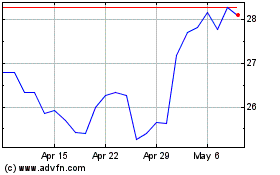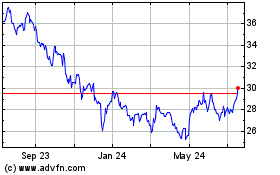A Guide to Coronavirus Vaccines in the Works
July 24 2020 - 9:17AM
Dow Jones News
By Eleanore Park and Jonathan Rockoff
Researchers around the world have been racing to develop
vaccines that can fight off the coronavirus. Now, a handful are
starting the final stage of testing, or will soon. Depending on the
results, some companies say their vaccines could be greenlighted
for use as soon as this year. Here's a look at some things to
know:
Q: Is there a vaccine for the new coronavirus?
A: Not yet. Only in January did researchers investigating a
mystery illness sickening people in Wuhan, China, confirm it was
caused by a new coronavirus, and it took weeks more before the
pathogen emerged as a global health threat. It usually takes
drugmakers years to research and test vaccines. Several Covid-19
vaccines moved into human trials within months. The progress is
remarkably rapid. Nevertheless, researchers need to conduct bigger
studies to make sure their promising candidates really are safe and
protect against the virus, and give regulators the data needed to
determine whether to authorize use.
Q: Why is a coronavirus vaccine important?
A: The new coronavirus has infected millions of people
world-wide, killing hundreds of thousands. Though the virus isn't
as deadly as other pathogens like Ebola, it spreads more easily.
Testing, social distancing and wearing masks can help reduce the
risks of transmission, health authorities say, and drugs could help
treat people who develop Covid-19, the disease caused by the
coronavirus. Yet, vaccines are needed to both protect an individual
from getting very sick and to limit the spread of the virus.
Without a vaccine, life can't return to normal.
Q: What progress is being made?
A: More than 20 vaccine candidates are in human testing, and
another 140 are in development, according to the World Health
Organization. Researchers have begun reporting results from
early-stage studies for the most advanced coronavirus vaccine
candidates. The results were positive, indicating the vaccines
appeared safe and produced an immune response. The trials also
helped researchers pinpoint the best doses for their coronavirus
vaccines.
Q: When would a vaccine become available?
A: The results from early-stage studies aren't enough to allow
widespread use. Late-stage trials, testing the shots in tens of
thousands of people, are now getting under way to confirm the
candidates are safe and prove they reduce the severity of disease
and even prevent infection. If the vaccine candidates succeed in
these so-called phase 3 trials, health regulators are expected to
allow use. Developers of the most-advanced vaccine candidates say
the authorizations could come as early as the fall. But that
doesn't mean everyone would get a shot right away. Initial supplies
would probably go to people who need it most, like doctors, nurses
and emergency responders, and essential workers at groceries,
pharmacies and mass-transit agencies. The vaccines may not become
widely available until next year.
Q: How do the vaccines work?
A: All vaccines work by training a person's immune system to
fight off a virus or bacteria, without causing a serious illness.
How the shots accomplish that varies, however. Coronavirus vaccine
researchers are using various technologies. Some shots are designed
to use a safe version of a virus causing a common cold to deliver
the Covid-19 fighting lessons. For example, the vaccine under
development by the University of Oxford and AstraZeneca PLC uses
the cold virus to deliver a weakened piece of the new coronavirus
to teach the body to attack the pathogen. Differently, vaccines
under development by Moderna Inc. and by a partnership between
Pfizer Inc. and BioNTech SE rely on a gene-based technology to
deliver their Covid-19 fighting lesson. These vaccines are designed
to deliver a piece of genetic code, known as messenger RNA, or
mRNA, carrying the coronavirus-fighting instructions to cells.
Researchers hope people will need only one shot, but it looks like
some vaccines may require another shot, known as a booster, to
sufficiently build up a person's defenses.
Q: Who would need to get one?
A: As many people as possible. Vaccination can do more than just
protect an individual against the coronavirus. The risk of
transmission could drop for everyone, health experts say, if enough
people get vaccinated. This is known as herd immunity. Researchers
aren't certain what percent of people would need to get coronavirus
vaccines for there to be herd immunity. Many estimate, based on
their understanding of the coronavirus, 60% to 70% of the
population would need to be immune.
Write to Eleanore Park at eleanore.park@wsj.com and Jonathan
Rockoff at jonathan.rockoff@wsj.com
(END) Dow Jones Newswires
July 24, 2020 09:02 ET (13:02 GMT)
Copyright (c) 2020 Dow Jones & Company, Inc.
Pfizer (NYSE:PFE)
Historical Stock Chart
From Mar 2024 to Apr 2024

Pfizer (NYSE:PFE)
Historical Stock Chart
From Apr 2023 to Apr 2024
